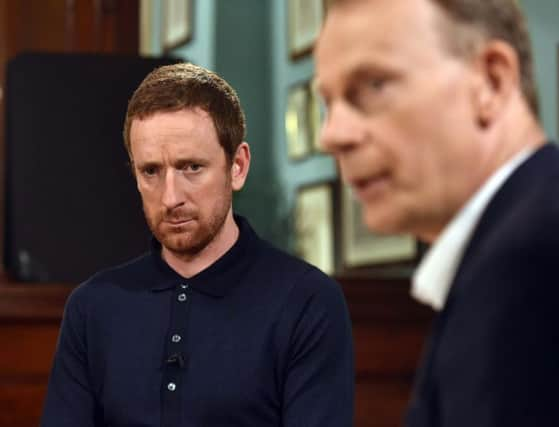Wiggins controversy focuses attention on the blurred '˜line'


It was about TUEs: the therapeutic use exemptions that Wiggins received to use a corticosteroid, triamcinolone, just days before the Tour de France in 2011 and 2012, which he won, and the Giro d’Italia in 2013.
For ten days Wiggins has been silent, releasing two brief statements but not answering the questions that were piling up. Meanwhile, medical opinion, so often divided and rarely unanimous, seemed to reach some kind of consensus: that Wiggins’ treatment for allergies – just before his major targets, using a product only used to treat the most severe cases, and potentially with performance-enhancing side-effects – looked sufficiently unusual to raise serious questions.
Advertisement
Hide AdAdvertisement
Hide AdAnd so to Sunday morning and what some were calling Wiggins’ ‘Oprah moment,’ a reference to Lance Armstrong’s infamous appearance with Oprah Winfrey, during which the former seven-time Tour winner confessed his doping sins.
But Wiggins’ TV appearance amounted to a defence, not a confession. He insisted that the treatment was “prescribed for allergies and respiratory problems. I’ve been a lifelong sufferer of asthma, and I – I went to my team doctor at the time and we went to a specialist to see if there’s anything else we could do to cure these problems. And he in turn said, ‘Yeah, there’s something you can do but you’re going to need authorisation from your cycling’s governing body.’”
Wiggins was examined by the specialist in February 2011. His team doctor, understood to be Richard Freeman, then applied for a TUE. This should then have been examined by a panel of three independent doctors before being approved. Prentice Steffen, the doctor at Wiggins’ former team, Garmin, expressed surprise last week that approval was sought and granted: “I think his doctor and his team, to make the decision to apply for that TUE is questionable,” said Steffen “and then I think for the UCI or UK Cycling or Wada to sign off on that application, all things considered, really that is the end point where the TUE committee should have looked at that and said ‘No, this is not acceptable, so we are not going to approve it’.” Where Marr should have pushed Wiggins for a clear answer was on the performance-enhancing effects of triamcinolone. Did Wiggins know that as well as clearing up any allergic symptoms there could be other, beneficial effects? Was he comfortable with that? When he was injected with the corticosteroid just days before the Tour de France, did he have any misgivings?
Wiggins sought to make a distinction between others’ use of triamcinolone and his: “They were abusing the drug in that era.” He insisted it wasn’t about trying to claim an unfair advantage, but “about putting myself back on a level playing field in order to compete at the highest level”.
Yet Wiggins had been competing and winning at the highest level all year in 2012. He finished fourth in the 2009 Tour (later upgraded to third), while on the Garmin team, without triamcinolone.
In 2010, when Team Sky entered the sport, I wrote a book about their first year, Sky’s the Limit. At the end of a difficult debut season I asked Dave Brailsford, the team principal, about their commitment to clean sport.
“The commitment to being clean, to using science, and alternative methods and the best possible brains as an alternative to doping, that is imperative,” said Brailsford. “It doesn’t stop us wanting to perform. It is a clean team. But we can’t say we’ll be clean but we won’t bother about winning.”
He mentioned “the line”. I asked what he meant. “You know, where the line is – between what’s allowed and what isn’t – in cycling can sometimes be a bit blurred. But we will not go over it.”
Advertisement
Hide AdAdvertisement
Hide AdBrailsford said he believed it was possible to win the Tour clean. “You have to. I believe the guys at that level are going right up to the line, like everyone else. I certainly don’t believe there is a clear, systematic doping programme in a team which is allowing those guys to perform that well. But I certainly think they go right up to the line.”
Team Sky have applied for 13 TUEs in their seven years, three of them for Wiggins. In doing so they have broken no rules. But the controversy around Wiggins’ triamcinolone injections should focus attention on “the line”: on where it is and to what extent it is open to interpretation. And whether, even if a legal line is not crossed, an ethical one can be breached. These are questions for Wiggins and Team Sky, but also for sport as a whole.